Please use these links to get the links below to get the latest content and update any links or bookmarks you might have.
LATEST VERSION OF THIS PAGE | LATEST SITE UPDATE LIST | THE NEW HOMEPAGE
UPDATED 082512 | ADDED 092711 | MACQUARIE ISLAND, AUSTRALIA | RETURN TO THE MAIN FUTURO HOUSE ARTICLE | RETURN HOME
|
082512 | An Update On "Googies"
Almost every website and article that references Futuros refers to the "Googies" as modified Futuros; indeed my pages have always done the same but I have never been really that convinced. There are too many differences, the size, the materials used to contruct them, the entrance and so on. Recently I have been digging deeper and as a result of that research [and the help of some great people at the AAD - thank you Jessica, Jonathan, Jan and Graeme] it is now clear that the "Googies" are not modified Futuros but rather something designed and constructed completely independantly.
Because of the evident similarity between "Googies" and Futuros and because of the fact that they are commonly reported to be modified Futuros [and also just because they are plain interesting in their own right] I intend to maintain my "Googie" pages and update and expand them as and when I have new information despite the fact that they are not in fact Futuros. You will find more detailed information and history related to the "Googies" here.
Waterfall Bay, Macquarie Island, Australia | 54°41'31.70"S 158°51'52.70"E
|
||
|
Featured Image © Commonwealth of Australia | Date Unknown
|
Google Maps | Satellite Imagery Date 031405
|
|
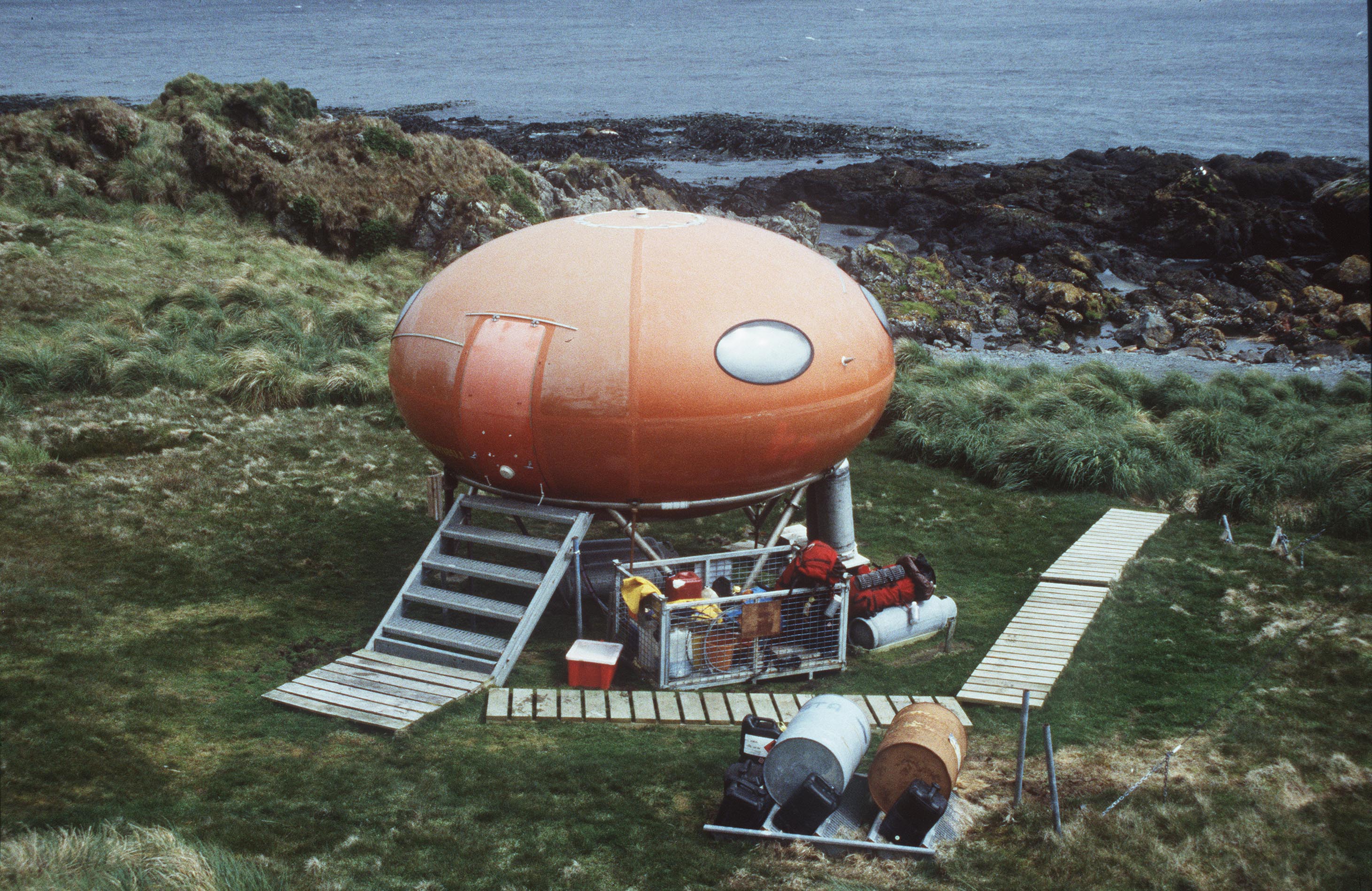
2763C1 , Waterfall Creek, Photograph by Heather Kirkpatrick Australian Antarctic Division, © Commonwealth of Australia Photograph Reproduced With The Permission Of The AAD | Date Unknown |
View Larger Map |
|
|
Additional Images
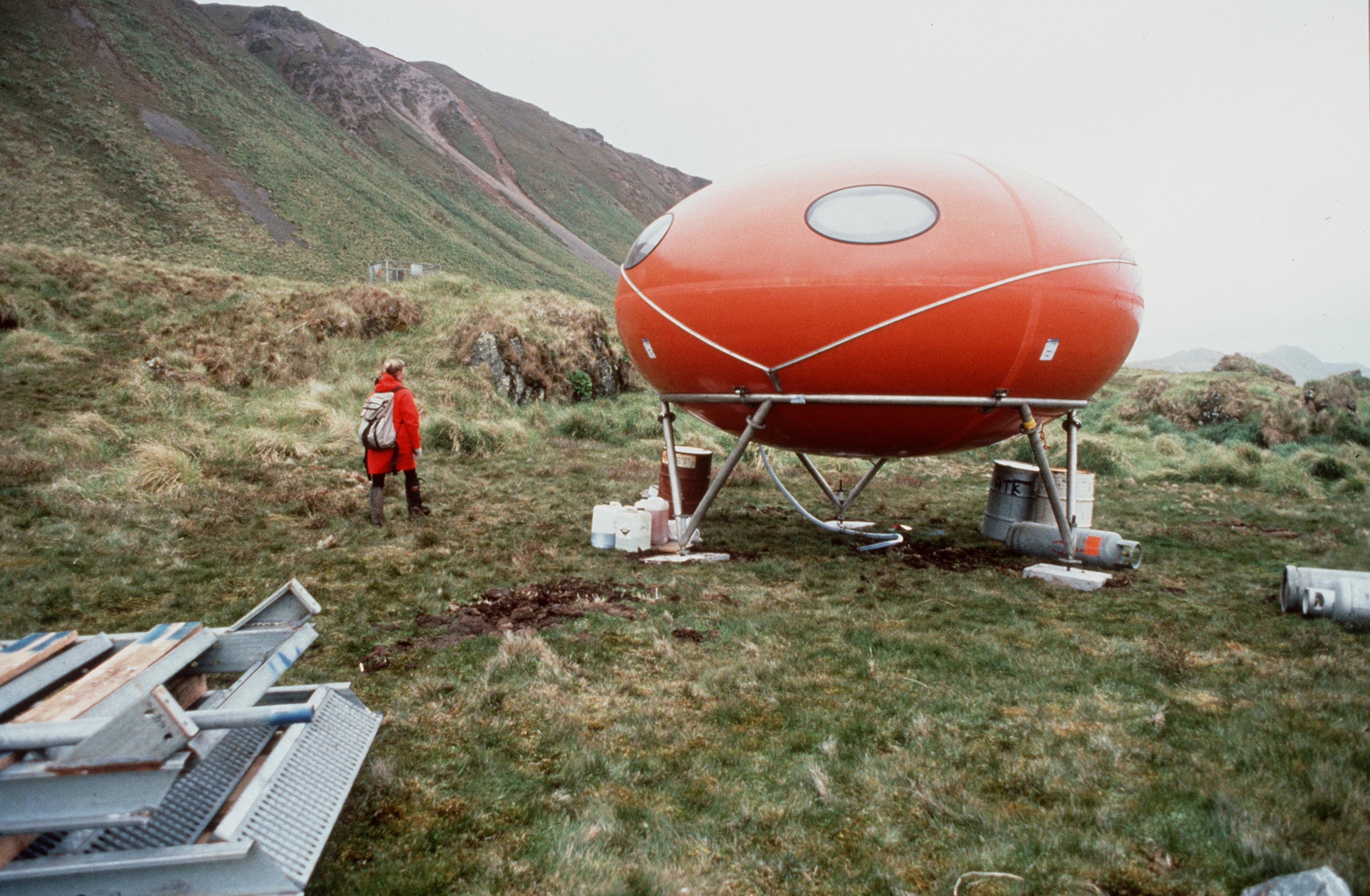
3537B4, Lusitania Bay, Macquarie Island, Photograph by Kevin Bell Australian Antarctic Division, © Commonwealth of Australia Photograph Reproduced With The Permission Of The AAD | Date Unknown 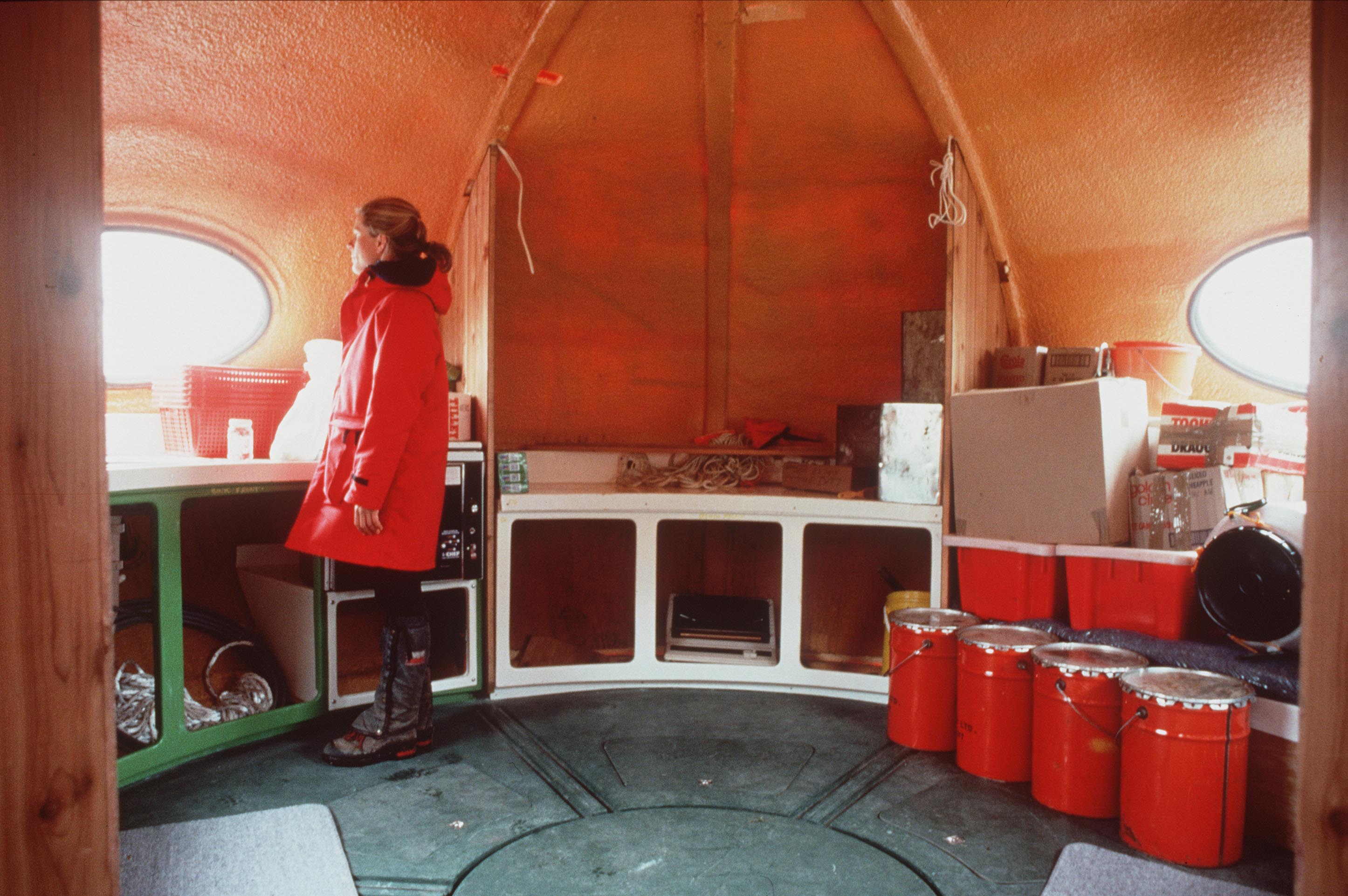
3537B4, Lusitania Bay, Macquarie Island, Photograph by Kevin Bell Australian Antarctic Division, © Commonwealth of Australia Photograph Reproduced With The Permission Of The AAD | Date Unknown
It should be noted that the image attributions for the two photos above reference Lusitania Bay. The AAD have confirmed that the Lusitania Bay and Waterfall Creek Locations are one and the same.
For a few additonal images including a really cool photo by Greg Stone can be found by following the links below:
The "Googie"
The initial impetus behind the creation of the Futuro was a desire to create a light, portable, easily heated ski cabin that could be located in adverse terrain. It is clear that those criteria made the Futuro at least a candidate for use as accommodation for some of the many scientific expeditions and bases that dot Antarctica which likely has the coldest and most inhospitable climate on the planet.
Antarctic Dictionary: A Complete Guide to Antarctic English "A large fiberglass field hut, usually orange, which is mounted on a steel frame in the manner of an egg in an egg-cup. The hut is a flattened sphere in shape, and looks remarkably like the traditional images of a flying saucer." The "Googie" Hut, or just plain "Googie" as it is often referred to was a modified Futuro manufactured in Australia specifically for use in the Antarctic region. The most obvious difference was the reduced number of windows but it retained most of the Futuro's design characteristics including being seated on a steel cradle. The chapter "A Catalogue of Temporary Field Accommodation Systems for Use in Antarctica" from an Australian Antarctic Division of the Australian Government Department Of Sustainability, Environment, Water, Population & Communities document discusses the use of the "Googie" and other types of structures in Antarctica. According to the AAD [and they should know] there are currently 5 "Googies" in use; two on Béchervaise Island, two on Macquarie Island [one at Brothers Point and this one at Waterfall Bay] and one on Hop Island near Davis. The AAD indicates that they have used "Googies" since the mid 1980's and have been well received by the individuals who have used them. The AAD describes the "Googie" as being constructed from fiberglass hemispheres mounted on a steel ring with multiple oval windows and access using a single vertical opening door; features listed include:
|
Notes, History & Resources
Updated 082511 With the kind assistance of several individuals [Jessica, Jonathan, Jan and Graeme - thank you all] who work at the AAD I am beginning to piece together a much clearer picture of the origins and history of the "Googies" or, as they seem to be also known, the "Smarties". It is also now clear that they are not modified Futuro's though they may have been possibly have been influenced in some way by the Futuro. For more detailed information and history on this check out this page. As far as the Waterfall Bay "Googie" is concerned I do not yet have a complete history and some of the references report conflicting dates but some things are certain. This "Googie" was one of four that were located at Spit Bay, Heard Island in the late 1980's and early 1990's and used as the base of operations for various research expeditions on the Island. Satellite imagery dated 051207 shows what appears likely to be the remains of the expedition base located at 53°6'23.36"S 73°43'16.13"E, I cannot be certain of this but there is not much of anything else visible on the island. In addition the photographers placement of this photo on Panoramio by eccles26 together with an examination of the geography in that photo and the photo below compared against the imagery in Google Earth also suggests very strongly that this was the expedition site. View Larger Map Heard is by far the largest of the islands in the McDonald Islands group; an Australian Territory since 1947 which is currently uninhabited and is one of the most remote places on Earth. Heard Island is home to Mawson Peak, a part of the "Big Ben" massif, that is one of only two active volcanoes in Australian territory. Topping out at 9006 feet Mawson Peak is also the highest point in Australian territory with the exception of peaks in the Antarctic Territory. This image below, reproduced here with the permission of the AAD shows the group of four "Googies" as they were on Heard Island around 1992. 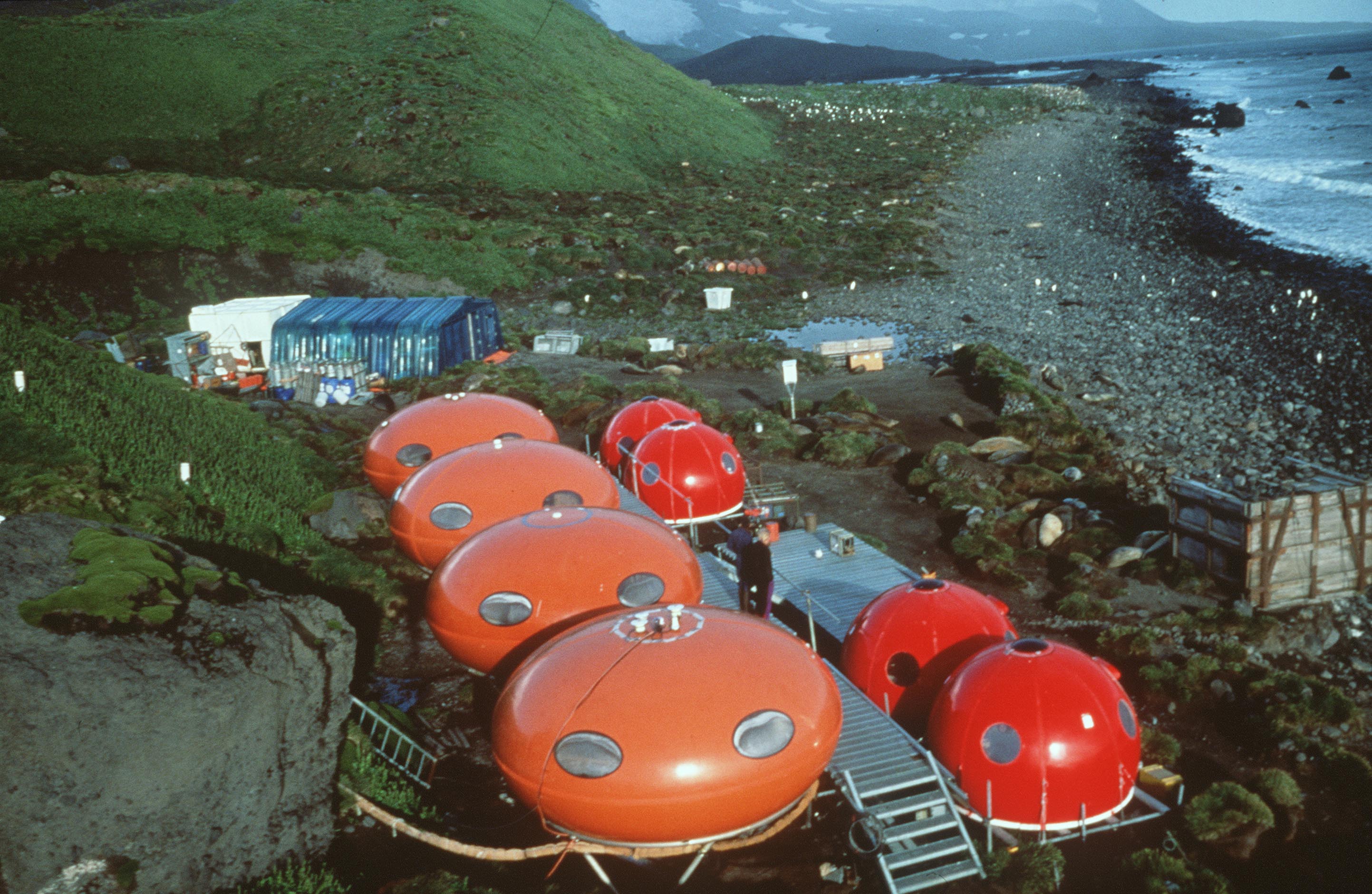
172B3 Spit Bay Winter Camp, Spit Bay, Heard Island, Photograph by Attila Vrana Australian Antarctic Division, © Commonwealth of Australia Photograph Reproduced With The Permission Of The AAD | Date Unknown Following completion of various expeditions on Heard Island the "Googies" were returned to Australia and later relocated to new sites on Berchavaise Island, Hop Island and Macquarie Island. Of course in total between those locations there are actually five "Googies" and I have yet to establish the origin of the fifth. This "Googie", variously referred to as being at Lusitania Bay or Waterfall Creek, was one of the ones from Spit Bay but the date of its arrival on Macquarie is unclear. In an unpublished May 1995 AAD Report titled "The Field Huts of Macquarie Island" [AAD, © Commonwealth of Australia] Mike Woolridge tells us that the "Googie", or as it was sometimes referred to at the time, "New Lusi", was refitted in late 1993 after being removed from Heard Island and returned to Australia and that it was then flown into its current loaction and assembled between 21 and 23 December 1993. Interestingly Mike Woolridge also notes that the steps and other finishing touches were then added over the next few days. That would suggest that the second picture down in the left panel was of the unit almost immediately after arriving on site because the steps are not present [you can actually see them on the ground bottom left of the photo]. On the other hand in the book "Subantarctic Wilderness: Macquarie Island I tend to think Mike Woolridge has it right, partly because of the detail and precise dates but also because the Google Maps satellite imagery dated 031405 at the top of this column clearly shows the "Googie" on site at that time and by my reckoning that would be late summer 1994/95. Original Information 092711 Macquarie Island, or as it is often known, Macca, is an island in the Pacific Ocean of some 47 square miles lying South-South-West of New Zealand about half way to Antarctica. The island is an Australian Territory and home to a permanent AAD base, the Macquarie Island Station and to two "Googies" [What is a "Googie" - see left for details]; this one at Waterfall Bay and a second further north at Brothers Point. I am an aficionado of Google Maps most of the time but in this case the map below [source: Wikipedia | Public Domain] shows the locations on the island to great effect [click the map for a larger image]; Waterfall Bay is about a two thirds of the way down the east coast of the island. You can also access a much better quality "pdf" map of Macquarie Island here. 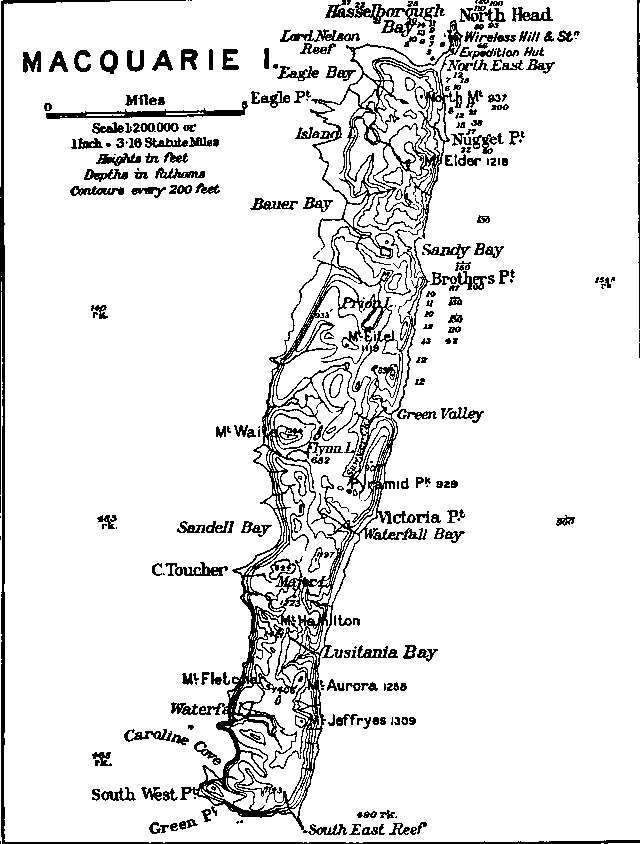
The AAD website describes the Waterfall Bay hut as follows: "Waterfall Bay hut is a 'Googie' style hut similar to that at Brothers Point and was put in place in 1993-94 as a replacement for the decrepit Lusitania Bay hut. It comfortably sleeps three people. Another three can fit on the floor, although this would be a crowd." You can get a feel for what life is like on this remote island and a perspective on the "Googie" through the eyes of several intrepid adventurers who have blogged about their experiences on "Macca"; Claudia on Macca, Anthony Cowles on Macquarie Island and Macca Summer. Not all specifically refer to the "Googie" at Waterfall Bay; some talk of the one at Brothers Point but they do all give a perspective on the island and its "Googies". If the blogs inspire you to want to visit the island and it's "Googies" it seems that Macquarie Island is indeed host to a small number of tourists through the course of the year. One company arranging such expeditions is Heritage Expeditions; others include Orion Expedition Cruises and Chimu Adventures. Though I doubt any of them could arrange for you to stay in one of the "Googies" those on Macquarie Island are probably the most hospitably located "Googies", the remaining ones are in Antarctica proper, so if you ever want to see one "in the wild" Macquarie Island might be the way to go. The Google Earth satellite imagery showing this "Googie" is from back in 2005 but the AAD on this web page indicates the "Googie" is still in use at Brother's Point [the page has a "last updated" date of 062911] and the blog Claudia on Macca in a post dated 091111 mentions the "Googie" - the latest is Claudia's date so that is the "confirmed" date for this Futuro/Googie. Sources & Reference
Got new, updated or corrected information or an image I could use?
I am always looking for additional information, history, details, images, videos; just about anything Futuro I guess - if you would like to contribute please use the Futuro Contact Form at the bottom of the main article or email me. As far as images go I am particularly interested in those that are either significantly better than the ones already on this page or show a different aspect or detail. If you own an image meeting one or both of those criteria I would love to be able to use it on this page but I will simply provide a link if that is your preference. Where permission is granted to use an image on the page appropriate attribution will be provided by means of a link to the original image, a link to a website of your choosing or both. |
|

